
Metal Part Casting
1.Metal Part Casting Introduction
It's crucial to remember that die casting and machining frequently complement one another to maximize the efficacy of the product line.
The best choice for producing a large number of dependable, consistent parts is die casting.
Casting and CNC machining skills are utilized in the production of Metal Accessories Casting Parts.
In order to save costs, our skilled team helps optimize the entire solution, including product design, casting, machining, heat treatment, surface treatment, and so on.
We specialize in metal part casting for a range of industries at our facilities, including consumer goods, industrial machinery, automotive, and aerospace. In close collaboration with clients, our team of knowledgeable engineers and metallurgists selects the best material for each unique application and optimizes the casting process to produce products of the greatest caliber and reliability.
The following steps are commonly involved in the metal casting process:
Mold design: In close collaboration with clients, our team of specialists creates molds that precisely match their needs. We develop molds with complex shapes and elaborate geometries using state-of-the-art software.
Making the mold: After the mold design is complete, it is made using CNC machining and additional tools.
Melting: To get the metal to its liquid condition, it is melted in a furnace.
Pouring: After the metal has melted, it is poured into the mold cavity and given time to solidify and cool.
Post-processing: After being taken out of the mold, the solidified metal component goes through other post-processing procedures such heat treatment, sandblasting, and cleaning.
We employ a variety of metal casting techniques at our facilities, such as investment casting, die casting, and sand casting, to create premium metal parts that precisely match our clients' requirements. For a comprehensive solution, we also supply a variety of secondary operations, including surface finishing, assembling, and machining.
You can rest assured to buy customized Metal Part Casting from us. Sunbright look forward to cooperating with you, if you want to know more, you can consult us now, we will reply to you in time!
2.Metal Part Casting Parameter (Specification)
The surface roughness is Ra 0.1-3.2.
CNC turning work range is φ0.5mm-φ150mm*300mm
CNC milling work range is 510mm*1020mm*500mm

3.Metal Part Casting Feature And Application
Three characteristics of metal component casting are economy, effectiveness, and adaptability. Casting metal is a versatile manufacturing method that can create items of different sizes, shapes, and levels of complexity. Furthermore, metal casting is a reasonably easy and effective manufacturing process that enables the mass manufacture of high-quality products. Metal casting is frequently more economical when compared to alternative manufacturing techniques like CNC machining, especially for larger parts or components with intricate geometries.
There are numerous industries that use metal part casting, including:
Automotive: Engine parts, transmission components, and other parts are produced using metal casting, which is extensively utilized in the automotive sector.
Aerospace: In the aerospace sector, metal casting is utilized to create intricate parts for airframes and engines.
Industrial machinery - Heavy-duty parts like gears, bearings, and valve bodies that can tolerate high levels of tension and wear are produced via metal casting.
Consumer products: A variety of consumer goods, including tools, appliances, and ornamental pieces, are made using metal casting.
All things considered, metal part casting is a crucial production method for a wide range of sectors due to its adaptability and affordability. It is a well-liked option for many different applications since it makes high-quality parts with intricate geometries and a variety of sizes and forms possible to produce.

4.Metal Part Casting Details
In order to save raw materials and achieve a superior surface finish by casting, these Metal Accessory Casting Parts are better suited for mass manufacturing.
We are capable of handling complex-structure, high-volume metal casting projects, meeting customer approval standards, and meeting quality standards.


